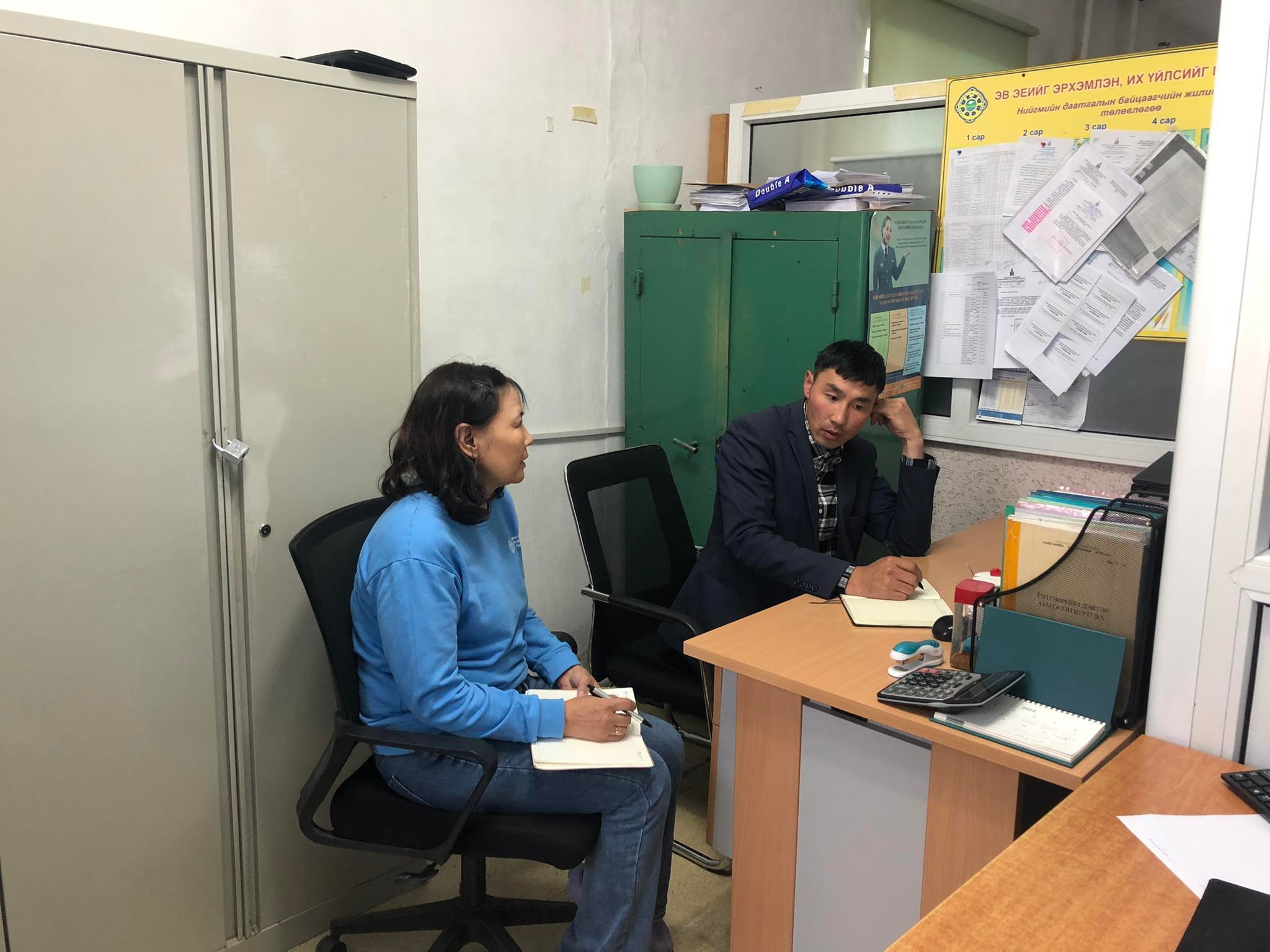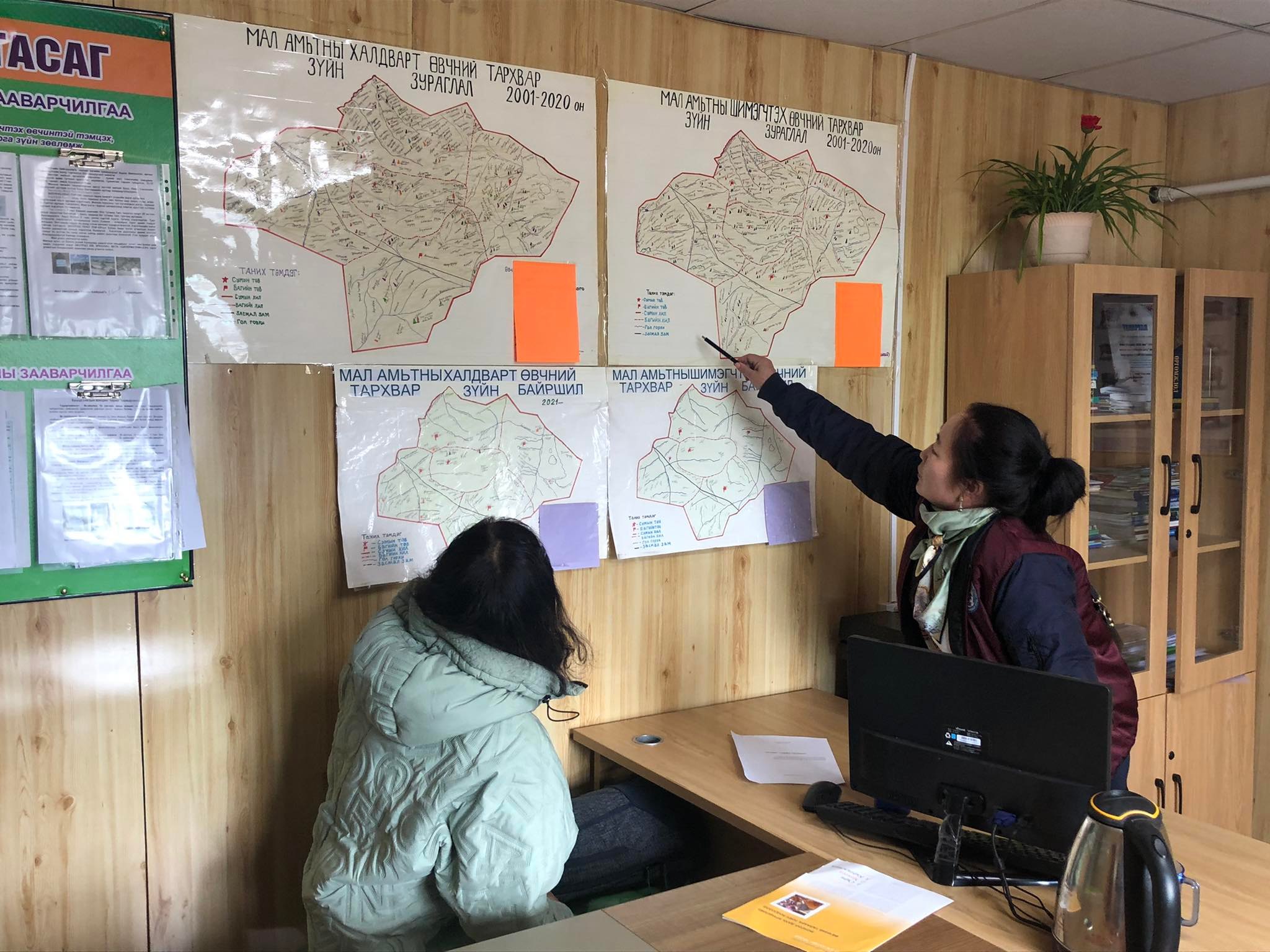Mongolia planning to assess national antimicrobial resistance (AMR) surveillance system
A mission will take place in Mongolia from 20 to 27 June, 2022 to assess the national antimicrobial resistance (AMR) surveillance system in the food and agriculture sectors. This activity is part of the new AMR Codex Texts (ACT) project “Implementation of Codex standards to support containment and reduction of foodborne antimicrobial resistance”, supported by the Government of Korea.
FAO has developed the “FAO Assessment Tool for Laboratories and Antimicrobial resistance Surveillance Systems (FAO-ATLASS)“ in order to support countries in assessing and improving their national AMR surveillance system in the food and agriculture sectors, which will be used as a key tool during this mission.

Meeting with Tsenkher sub-province Head of agri-food section
As part of their preparations, the ACT project manager in Mongolia, Jargalmaa Radnaabazar, met with different stakeholders to introduce the ACT project, its goal and objectives, visited laboratories to conduct the ATLASS pre-questionnaire, interviews, group discussions and select the Arkhangai ATLASS focal point for the training in Ulaanbaatar. Discussions confirmed that the food safety and AMR standards strategy of Mongolia is in line with the purpose of the ACT project and there are many possibilities for collaboration. Stakeholders noted to need to plan awareness-raising activities for agri-food specialists, as well as for herders and farmers; there is also a need to improve laboratory capacities.

Visit to Undur-Ulaan sub-province lab
The ATLASS mission in Mongolia consists of four parts:
- Training the specialists from Ulaanbaatar and three provincial laboratories
- Workshop on ATLASS methodology with relevant stakeholders from the agri-food sector
- Assessment of the regional laboratory in Tuv province
- Workshop to introduce the results, findings and provide recommendations
The new AMR Codex Texts (ACT) project will help with the implementation of Codex standards globally and locally, especially those related to the containment and reduction of foodborne AMR as well as monitoring and surveillance. The project will lead to better management of foodborne AMR in six focus countries in Asia and South America: Bolivia, Cambodia, Colombia, Mongolia, Nepal and Pakistan. By improving access to international markets and protecting consumers against the risks of AMR, the project will contribute to more inclusive, safe and efficient food systems. Results will then be used to plan effective interventions to promote the adoption of Codex standards in other countries.
Learn more
AMR ACT project information web page
Photo credit © FAO/Jargalmaa Radnaabazar
At the heart of the Codex mandate are the core values of collaboration, inclusiveness, consensus building and transparency. Governmental and non-governmental, public and private organizations alike play a vital role in ensuring Codex texts are of the highest quality and based on sound science.
Codex would have little authority in the field of international standard setting if it did not welcome and acknowledge the valuable contributions made by observers. Expert technical bodies, industry and consumer associations
contribute to the standard-setting process in a spirit of openness, collaboration and transparency.
Intergovernmental organizations (IGOs) and international non-governmental organizations (NGOs) can apply for observer status in Codex in order to attend and put forward their views at every stage of the standard-setting process.
 Current Codex Alimentarius Commission
Current Codex Alimentarius Commission
Mongolia planning to assess national antimicrobial resistance (AMR) surveillance system
A mission will take place in Mongolia from 20 to 27 June, 2022 to assess the national antimicrobial resistance (AMR) surveillance system in the food and agriculture sectors. This activity is part of the new AMR Codex Texts (ACT) project “Implementation of Codex standards to support containment and reduction of foodborne antimicrobial resistance”, supported by the Government of Korea.
FAO has developed the “FAO Assessment Tool for Laboratories and Antimicrobial resistance Surveillance Systems (FAO-ATLASS)“ in order to support countries in assessing and improving their national AMR surveillance system in the food and agriculture sectors, which will be used as a key tool during this mission.

Meeting with Tsenkher sub-province Head of agri-food section
As part of their preparations, the ACT project manager in Mongolia, Jargalmaa Radnaabazar, met with different stakeholders to introduce the ACT project, its goal and objectives, visited laboratories to conduct the ATLASS pre-questionnaire, interviews, group discussions and select the Arkhangai ATLASS focal point for the training in Ulaanbaatar. Discussions confirmed that the food safety and AMR standards strategy of Mongolia is in line with the purpose of the ACT project and there are many possibilities for collaboration. Stakeholders noted to need to plan awareness-raising activities for agri-food specialists, as well as for herders and farmers; there is also a need to improve laboratory capacities.

Visit to Undur-Ulaan sub-province lab
The ATLASS mission in Mongolia consists of four parts:
- Training the specialists from Ulaanbaatar and three provincial laboratories
- Workshop on ATLASS methodology with relevant stakeholders from the agri-food sector
- Assessment of the regional laboratory in Tuv province
- Workshop to introduce the results, findings and provide recommendations
The new AMR Codex Texts (ACT) project will help with the implementation of Codex standards globally and locally, especially those related to the containment and reduction of foodborne AMR as well as monitoring and surveillance. The project will lead to better management of foodborne AMR in six focus countries in Asia and South America: Bolivia, Cambodia, Colombia, Mongolia, Nepal and Pakistan. By improving access to international markets and protecting consumers against the risks of AMR, the project will contribute to more inclusive, safe and efficient food systems. Results will then be used to plan effective interventions to promote the adoption of Codex standards in other countries.
Learn more
AMR ACT project information web page
Photo credit © FAO/Jargalmaa Radnaabazar
 Codex and Observer
Codex and Observer
around the world since ancient times.
We might not always know where it comes from,
but we expect it to be available, safe and of good quality.









Leave a comment